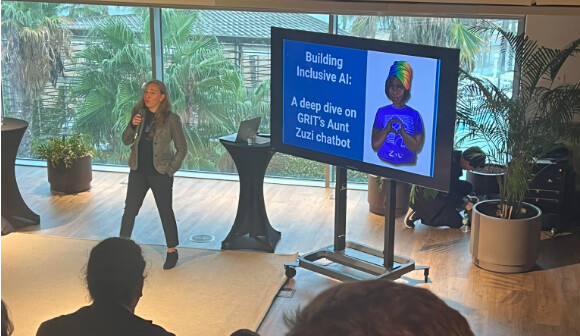At the recent #AIforDevelopment Conference, I had the opportunity to attend a compelling presentation by Emily Springer, an independent consultant and one of the Top 100 Women in AI Ethics™ 2024. Her session, titled “Inclusive, Ethical, Feminist AI: From Theory to Practice in GRIT’s Aunt Zuzi Chatbot,” resonated deeply with me and reinforced the importance of a #feminist approach to AI in aid and development.

Springer began by emphasizing that “AI for good” should not be assumed—it must be proven. In a field saturated with hype, AI developers must demonstrate tangible benefits, especially when working on social impact projects. I fully agree with her point that we need to be vigilant about showing real, positive outcomes. The core of her presentation focused on GRIT’s Aunt Zuzi chatbot, a project aimed at providing reliable, compassionate information to survivors of gender-based violence (GBV) in South Africa. The development process showcased the importance of participatory design, involving diverse user groups from urban centers like Cape Town to rural areas in the Eastern Cape.
The participatory approach, which involved 35 workshops across various communities, was crucial in collecting data on vocabulary, language associations, and contextual nuances. This method ensured that the chatbot genuinely resonated with users, capturing local slang and culturally embedded meanings. I found it particularly inspiring how Springer stressed that AI tools must reflect the lived experiences of those they aim to support. This required developing unique word dictionaries and building robust data models—a practice I believe should be standard in all ethical AI work.
Technical challenges were also a focal point. Ensuring trauma-informed responses and addressing multilingual inputs were significant hurdles that GRIT faced. Springer highlighted the funding realities of compute resources, warning developers about potential financial pitfalls and advocating for funders to prioritize holistic support for AI projects beyond just the initial build phase—a point I wholeheartedly support.
Springer concluded by urging the tech community to shift from just building AI systems to creating inclusive, ethically grounded processes centered on fairness, explainability, and participatory practices. I echo her call: only through such a #feminist approach can we ensure that AI serves everyone equitably and thoughtfully. Her message was clear: we have both the opportunity and the responsibility to build AI that genuinely works for all.